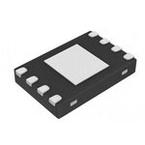The STTS2002 is targeted for DIMM modules in mobile personal computing platforms (laptops), servers and other industrial applications. The thermal sensor (TS) in the STTS2002 is compliant with the JEDEC specification TSE2002a2, which defines memory module thermal sensors requirements for mobile platforms. The 2 Kb serial presence detect (SPD) I2C-compatible electrically erasable programmable memory (EEPROM) in the STTS2002 is organized as 256 x8 bits and is functionally identical to the industry standard M34E02.
●The TS-SPD EEPROM combination provides space as well as cost savings for mobile and server platform dual inline memory modules (DIMM) manufacturers, as it is packaged in the compact 2 mm x 3 mm 8-lead TDFN package with a thinner maximum height of 0.80 mm. The DN package is compliant to JEDEC MO-229, variation WCED-3.
●The digital temperature sensor has a programmable 9-12 bit analog-to-digital converter (ADC) which monitors and digitizes the temperature to a resolution of up to 0.0625 °C. The default resolution is 0.25 °C/LSB (10-bit). The typical accuracies over these temperature ranges are: ±2 °C over the full temperature measurement range of –40 °C to 125 °C, ±1 °C in the +40 °C to +125 °C active temperature range, and ±0.5 °C in the +75 °C to +95 °C monitor temperature range.
●The temperature sensor in the STTS2002 is specified for operating at supply voltages from 2.3 V to 3.6 V. Operating at 3.3 V, the typical supply current is 160 μA (includes SMBus communication current).
●The on-board sigma delta ADC converts the measured temperature to a digital value that is calibrated in °C. For Fahrenheit applications, a lookup table or conversion routine is required. The STTS2002 is factory-calibrated and requires no external components to measure temperature.
●The digital temperature sensor component has user-programmable registers that provide the capabilities for DIMM temperature-sensing applications. The open drain event output pin is active when the monitoring temperature exceeds a programmable limit, or it falls above or below an alarm window. The user has the option to set the event output as a critical temperature output. This pin can be configured to operate in either a comparator mode for thermostat operation or in interrupt mode.
●The 2 Kb serial EEPROM memory in the STTS2002 has the ability to permanently lock the data in its first half (upper) 128 bytes (locations 00h to 7Fh). This feature has been designed specifically for use in DRAM DIMMs with SPD. All of the information concerning the DRAM module configuration (e.g. access speed, size, and organization) can be kept write protected in the first half of the memory. The second half (lower) 128 bytes of the memory can be write protected using two different software write protection mechanisms.
●By sending the device a specific sequence, the first 128 bytes of the memory become write protected: permanently or resettable. In the STTS2002 the write protection of the memory array is dependent on whether the software protection has been set.
●Key Features
● 2.3 V memory module temperature sensor with integrated 2 Kb SPD EEPROM
● Forward compatible with JEDEC TSE 2002a2 and backward compatible with STTS424E02
● Operating temperature range:
● –40 °C to +125 °C
● Single supply voltage: 2.3 V to 3.6 V
● 2 mm x 3 mm TDFN8, height: 0.80 mm (max)
● JEDEC MO-229, WCED-3 compliant
● RoHS compliant, halogen-free
● Temperature sensor
● Temperature sensor resolution: programmable (9-12 bits)0.25 °C (typ)/LSB - (10-bit) default
● Temperature sensor accuracy (max):
● ± 1 °C from +75 °C to +95 °C
● ± 2 °C from +40 °C to +125 °C
● ± 3 °C from –40 °C to +125 °C
● ADC conversion time: 125 ms (max) at default resolution (10-bit)
● Typical operating supply current: 160 μA (EEPROM standby)
● Temperature hysteresis selectable set points from: 0, 1.5, 3, 6.0 °C
● Supports SMBus timeout 25 ms - 35 ms
● 2 Kb SPD EEPROM
● Functionality identical to ST’s M34E02 SPD EEPROM
● Permanent and reversible software data protection for the lower 128 bytes
● Byte and page write (up to 16 bytes)
● Self-time WRITE cycle (5 ms, max)
● Automatic address incrementing
● Two-wire bus
● Two-wire SMBus/I2 C - compatible serial interface
● Supports up to 400 kHz transfer rate
● Does not initiate clock stretching


